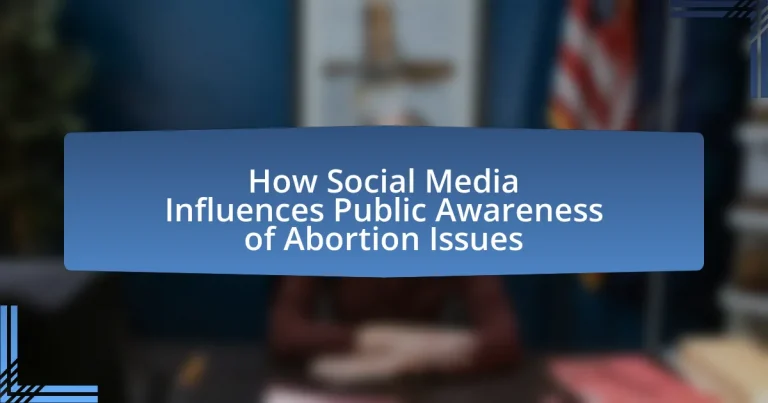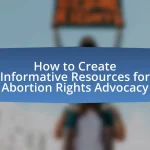The article examines how social media shapes public awareness of abortion issues by facilitating the rapid sharing of information and diverse perspectives. It highlights the role of platforms like Twitter, Facebook, and Instagram in disseminating personal stories, educational content, and advocacy campaigns, which influence public opinion and engagement, particularly among younger demographics. The article also discusses the impact of algorithms on the visibility of abortion-related content, the effectiveness of various content types in raising awareness, and the importance of accurate information in combating misinformation. Additionally, it addresses the challenges of censorship, the risks faced by activists, and strategies for leveraging social media effectively for abortion advocacy.
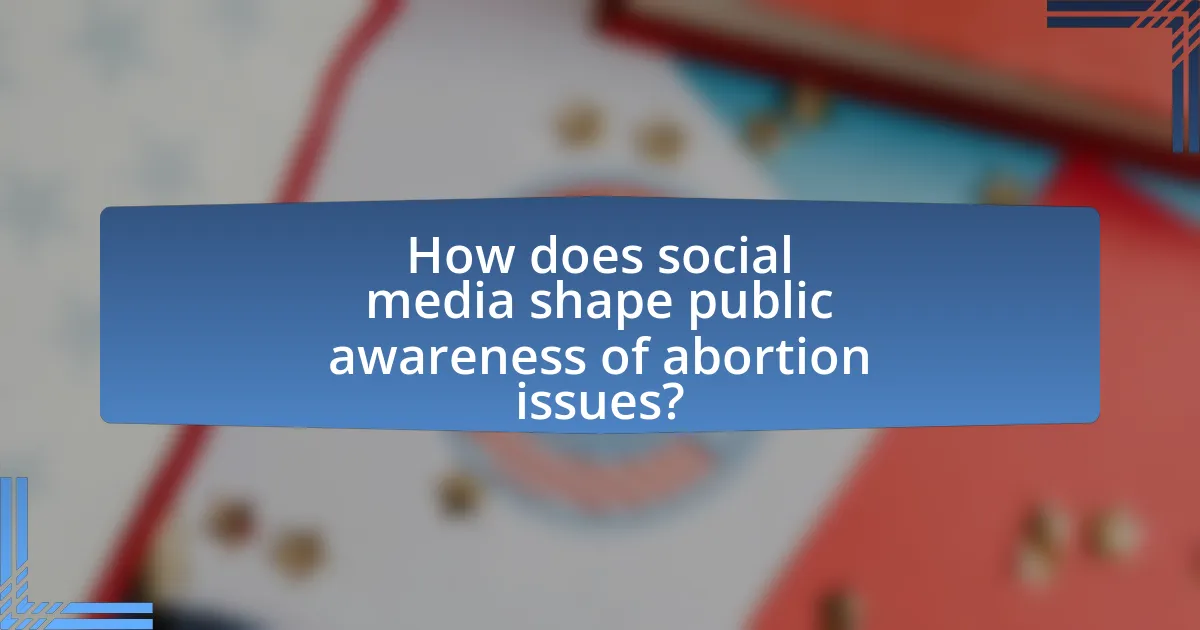
How does social media shape public awareness of abortion issues?
Social media significantly shapes public awareness of abortion issues by facilitating the rapid dissemination of information and diverse perspectives. Platforms like Twitter, Facebook, and Instagram allow users to share personal stories, educational content, and advocacy campaigns, which can influence public opinion and mobilize support. For instance, a study published in the Journal of Medical Internet Research found that social media discussions around abortion can increase awareness and engagement, particularly among younger demographics. This engagement often leads to greater visibility of both pro-choice and pro-life viewpoints, contributing to a more informed public discourse on the topic.
What role do social media platforms play in disseminating information about abortion?
Social media platforms play a crucial role in disseminating information about abortion by providing a space for sharing personal stories, educational content, and advocacy messages. These platforms enable users to access diverse perspectives and resources, facilitating discussions that can influence public opinion and awareness. For instance, studies have shown that social media campaigns can significantly increase knowledge about reproductive rights and access to abortion services, as evidenced by the #ShoutYourAbortion campaign, which encouraged individuals to share their experiences and reduce stigma. Additionally, social media serves as a tool for organizations to mobilize support, organize events, and disseminate real-time updates on legislative changes affecting abortion rights, thereby shaping the public discourse surrounding the issue.
How do algorithms influence the visibility of abortion-related content?
Algorithms significantly influence the visibility of abortion-related content by determining which posts are prioritized in users’ feeds based on engagement metrics and user preferences. Social media platforms like Facebook and Instagram utilize algorithms that favor content with higher interaction rates, meaning posts about abortion that receive more likes, shares, or comments are more likely to be seen by a larger audience. For instance, a study by the Pew Research Center found that 64% of Americans believe social media platforms play a crucial role in shaping public discourse, including sensitive topics like abortion. Consequently, this algorithmic bias can either amplify or suppress abortion-related discussions, depending on the prevailing sentiments and interactions surrounding such content.
What types of content are most effective in raising awareness about abortion?
Visual content, such as infographics and videos, is most effective in raising awareness about abortion. Research indicates that visual formats engage audiences more effectively than text alone, leading to higher retention and sharing rates. For instance, a study by the Pew Research Center found that 64% of social media users are more likely to share visual content, which can amplify messages about abortion rights and access. Additionally, personal stories shared through social media platforms resonate deeply, as they humanize the issue and foster empathy, making the topic more relatable and urgent.
Why is public awareness of abortion issues important?
Public awareness of abortion issues is important because it shapes societal attitudes, informs policy decisions, and influences access to reproductive healthcare. Increased awareness leads to informed discussions, reducing stigma and misinformation surrounding abortion. For instance, studies show that states with higher public awareness and education on reproductive rights tend to have more supportive policies and better access to services. This correlation highlights the role of awareness in promoting reproductive justice and ensuring that individuals can make informed choices about their health.
How does increased awareness impact public opinion on abortion?
Increased awareness significantly shifts public opinion on abortion by fostering informed discussions and reducing stigma. Research indicates that exposure to diverse perspectives through social media platforms enhances understanding of the complexities surrounding abortion, leading to more nuanced views. For instance, a study by the Pew Research Center found that individuals who engage with abortion-related content on social media are more likely to express empathy towards those affected by abortion decisions, thus influencing their overall stance on the issue. This shift in perspective often results in greater support for reproductive rights and policies that protect access to abortion services.
What are the potential consequences of misinformation regarding abortion?
Misinformation regarding abortion can lead to significant public health consequences, including increased stigma, confusion about legal rights, and potential harm to individuals seeking care. For instance, false claims about the safety of abortion procedures can deter individuals from accessing necessary medical services, resulting in negative health outcomes. A study published in the American Journal of Public Health found that misinformation can contribute to lower rates of safe abortions and higher rates of unsafe procedures, which can lead to complications and increased mortality. Additionally, misinformation can influence public opinion and policy, leading to restrictive laws that do not reflect the actual needs or rights of individuals.
How do different demographics engage with abortion discussions on social media?
Different demographics engage with abortion discussions on social media through varying levels of participation, tone, and platform preference. For instance, younger individuals, particularly those aged 18-29, are more likely to use platforms like Instagram and TikTok to share personal stories and advocate for reproductive rights, often employing hashtags to amplify their messages. In contrast, older demographics, such as those aged 50 and above, tend to engage more on Facebook, where discussions may focus on political implications and legislative changes.
Research indicates that women are more likely than men to participate in abortion discussions online, with a study by the Pew Research Center showing that 60% of women have shared their views on social media compared to 45% of men. Additionally, racial and ethnic minorities, particularly Black and Hispanic communities, often utilize social media to highlight intersectional issues related to abortion, such as systemic racism and healthcare access, thereby enriching the discourse with diverse perspectives.
Overall, the engagement patterns reflect not only age and gender differences but also cultural contexts, shaping how abortion is discussed and understood across various social media platforms.
What age groups are most active in discussing abortion on social media?
Individuals aged 18 to 29 are the most active in discussing abortion on social media. Research indicates that this age group frequently engages in conversations about reproductive rights, often utilizing platforms like Twitter and Instagram to express their views. A study by the Pew Research Center found that 70% of young adults are more likely to share their opinions on social media regarding social issues, including abortion, compared to older age groups. This trend highlights the significant role that younger demographics play in shaping public discourse on abortion through digital platforms.
How do cultural backgrounds influence perspectives on abortion shared online?
Cultural backgrounds significantly influence perspectives on abortion shared online by shaping individual beliefs, values, and attitudes towards reproductive rights. For instance, in cultures with strong religious affiliations, such as many conservative Christian communities, abortion is often viewed as morally unacceptable, leading to online discourse that emphasizes pro-life arguments. Conversely, in more liberal or secular cultures, such as those found in parts of Western Europe, abortion may be framed as a fundamental right, resulting in online discussions that advocate for pro-choice perspectives. Research indicates that these cultural differences manifest in social media discussions, where users often echo the prevailing norms and values of their communities, thus reinforcing their stance on abortion.
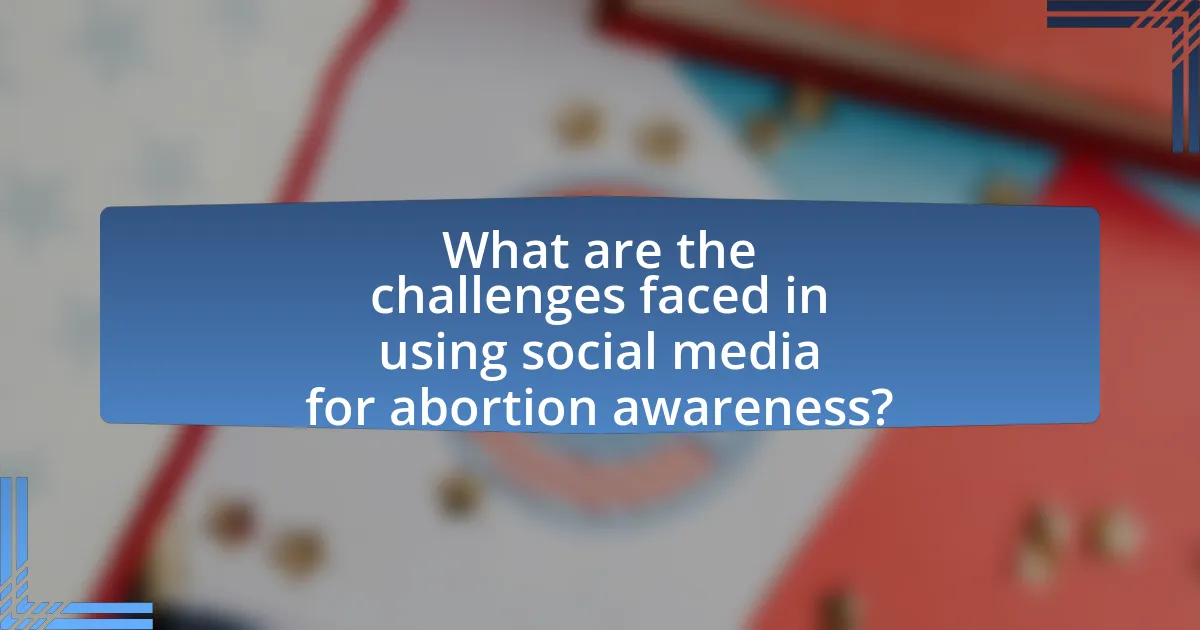
What are the challenges faced in using social media for abortion awareness?
The challenges faced in using social media for abortion awareness include misinformation, censorship, and polarized opinions. Misinformation can spread rapidly on social media platforms, leading to confusion about abortion facts and services; for instance, a study by the Pew Research Center found that 64% of Americans believe misinformation is a major problem on social media. Censorship occurs when platforms restrict content related to abortion, limiting the reach of accurate information; for example, Facebook has faced criticism for removing posts that discuss abortion services. Additionally, polarized opinions create an environment where constructive dialogue is difficult, as users often encounter extreme viewpoints that can discourage open discussion. These challenges hinder effective communication and awareness efforts regarding abortion issues.
How does censorship affect abortion-related discussions on social media?
Censorship significantly restricts abortion-related discussions on social media by limiting the exchange of information and perspectives. This suppression can lead to a lack of awareness about reproductive rights, as users may be unable to access critical resources, support networks, or diverse viewpoints. For instance, a study by the Pew Research Center found that 70% of social media users have encountered content moderation that affects discussions on sensitive topics, including abortion. This moderation can create an environment where misinformation thrives, as users may turn to less regulated platforms for information, further complicating public understanding of abortion issues.
What measures do platforms take to regulate abortion content?
Platforms regulate abortion content through a combination of content moderation policies, algorithmic adjustments, and partnerships with fact-checking organizations. For instance, social media companies like Facebook and Twitter implement community standards that prohibit misinformation and harmful content related to abortion. These standards often lead to the removal of posts that violate guidelines, such as those promoting unsafe practices or spreading false information about abortion services. Additionally, platforms may employ algorithms to limit the visibility of content deemed inappropriate or misleading, thereby controlling the narrative surrounding abortion discussions. Furthermore, collaborations with fact-checkers help ensure that users receive accurate information, as seen in Facebook’s initiative to label posts that contain disputed claims about abortion. These measures collectively aim to create a safer online environment while influencing public awareness of abortion issues.
How do users respond to censorship of abortion discussions?
Users typically respond to censorship of abortion discussions with increased frustration and vocal opposition. This reaction is often manifested through protests, social media campaigns, and the creation of alternative platforms for discussion. For instance, a study by the Pew Research Center found that 70% of users believe that social media should allow open discussions on controversial topics, including abortion. This indicates a strong desire for free expression and highlights the backlash against perceived censorship. Additionally, users may mobilize to share information and resources, countering the censorship by amplifying their voices through hashtags and community organizing.
What are the risks of online activism related to abortion issues?
Online activism related to abortion issues carries several risks, including harassment, misinformation, and potential legal repercussions. Activists may face targeted harassment from opposing groups, which can lead to threats and doxxing, as evidenced by numerous reports of online abuse against individuals advocating for reproductive rights. Misinformation can spread rapidly on social media platforms, leading to confusion and misinterpretation of abortion laws and health information, as seen in various studies highlighting the prevalence of false narratives surrounding abortion. Additionally, legal risks may arise from sharing certain types of content, especially in jurisdictions with strict laws regarding abortion, where activists could face prosecution for promoting or facilitating access to abortion services.
How can online campaigns backfire or lead to negative consequences?
Online campaigns can backfire or lead to negative consequences by generating backlash against the intended message or brand. For instance, poorly executed campaigns may be perceived as insensitive or offensive, resulting in public outrage and damaging the reputation of the organization involved. A notable example is the 2017 Pepsi advertisement featuring Kendall Jenner, which faced widespread criticism for trivializing social justice movements, leading to its swift withdrawal and a significant loss in brand credibility. Additionally, misinformation spread through online campaigns can exacerbate existing tensions and polarize audiences, further complicating the discourse surrounding sensitive issues like abortion.
What safety concerns do activists face when discussing abortion online?
Activists discussing abortion online face significant safety concerns, including harassment, doxxing, and threats of violence. These risks arise from the polarizing nature of the abortion debate, where individuals may receive aggressive backlash from opposing viewpoints. For instance, a study by the Pew Research Center found that 41% of social media users have experienced online harassment, with activists often being targeted due to their advocacy. Additionally, the anonymity of online platforms can embolden individuals to engage in harmful behaviors, further endangering activists’ personal safety and mental well-being.
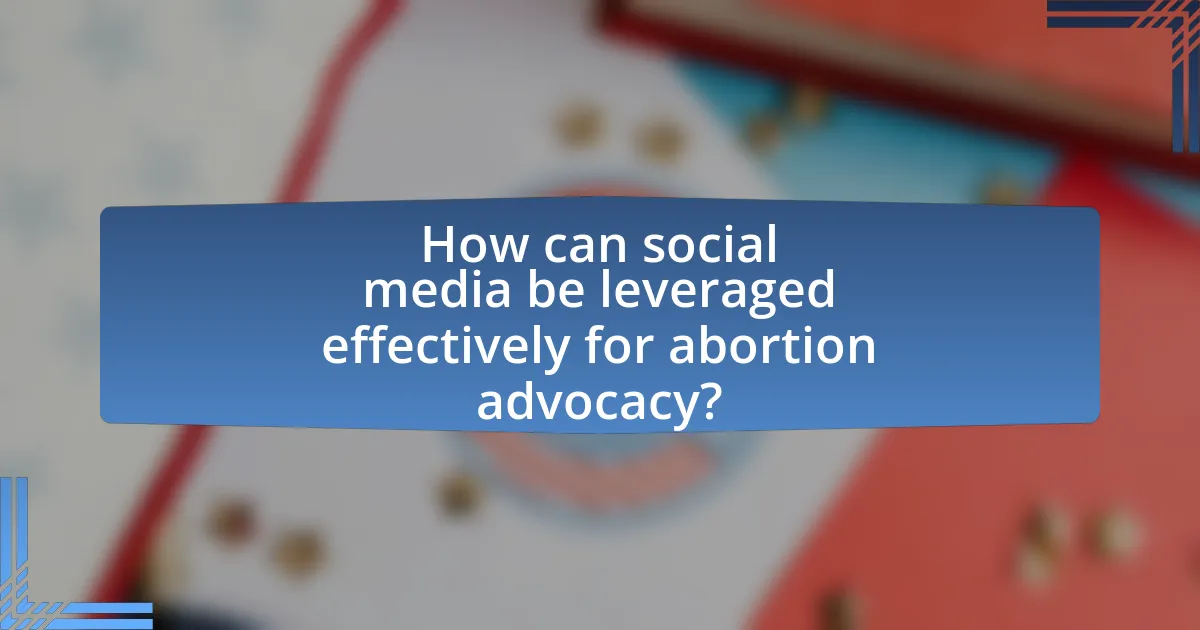
How can social media be leveraged effectively for abortion advocacy?
Social media can be leveraged effectively for abortion advocacy by creating targeted campaigns that raise awareness, mobilize supporters, and provide accurate information. These campaigns can utilize platforms like Twitter, Instagram, and Facebook to disseminate educational content, share personal stories, and engage in discussions that challenge misinformation. For instance, the #ShoutYourAbortion campaign has successfully encouraged individuals to share their experiences, fostering a supportive community and normalizing conversations around abortion. Additionally, data shows that social media can significantly increase engagement; a study by the Pew Research Center found that 69% of adults use social media, making it a powerful tool for reaching diverse audiences. By strategically using hashtags, collaborating with influencers, and organizing virtual events, abortion advocacy groups can amplify their message and drive meaningful change.
What strategies can organizations use to enhance their abortion awareness campaigns on social media?
Organizations can enhance their abortion awareness campaigns on social media by utilizing targeted messaging, engaging visuals, and partnerships with influencers. Targeted messaging ensures that the content resonates with specific demographics, increasing the likelihood of engagement; for instance, research shows that tailored messages can improve response rates by up to 50%. Engaging visuals, such as infographics and videos, can effectively convey complex information quickly, as studies indicate that posts with images receive 94% more views than text-only posts. Collaborating with influencers who align with the campaign’s values can amplify reach and credibility, as influencer marketing has been shown to generate 11 times higher ROI than traditional advertising. These strategies collectively enhance visibility and impact of abortion awareness campaigns on social media platforms.
How can storytelling be utilized to connect with audiences on abortion issues?
Storytelling can be utilized to connect with audiences on abortion issues by humanizing the experiences surrounding the topic, making it relatable and emotionally impactful. Personal narratives shared through social media platforms can illustrate the complexities of abortion decisions, fostering empathy and understanding among diverse audiences. For instance, studies show that individuals who engage with personal stories about abortion are more likely to reconsider their views, as these narratives often highlight the emotional and social factors involved, rather than just the political aspects. This approach can effectively bridge gaps in understanding and create a more informed public discourse on abortion issues.
What role do influencers play in promoting abortion awareness on social media?
Influencers play a significant role in promoting abortion awareness on social media by leveraging their platforms to educate followers, share personal stories, and advocate for reproductive rights. They often use their reach to disseminate information about abortion access, legal rights, and health resources, thereby increasing visibility and understanding of the issue. For instance, a study by the Pew Research Center found that 69% of social media users have encountered content related to reproductive health, indicating the effectiveness of influencers in shaping public discourse. By engaging their audiences through relatable content, influencers can destigmatize abortion and encourage open conversations, ultimately fostering a more informed public.
What best practices should be followed for effective communication about abortion on social media?
Effective communication about abortion on social media should prioritize clarity, empathy, and factual accuracy. Clear messaging helps convey complex issues simply, while empathy fosters understanding and respect for diverse perspectives. Factual accuracy is crucial, as misinformation can lead to harmful consequences; for instance, studies show that misinformation about abortion can influence public opinion and policy decisions negatively. Engaging with credible sources, such as medical organizations and research studies, enhances the reliability of shared information. Additionally, using inclusive language and acknowledging the emotional weight of the topic can create a supportive environment for discussion.
How can accurate information be ensured in social media posts about abortion?
Accurate information in social media posts about abortion can be ensured by implementing fact-checking protocols and promoting credible sources. Fact-checking organizations, such as PolitiFact and Snopes, evaluate claims and provide verified information, which can be linked or referenced in posts. Additionally, social media platforms can establish partnerships with health organizations like the World Health Organization and the American College of Obstetricians and Gynecologists to disseminate accurate data and guidelines. Research indicates that misinformation can significantly impact public perception; for instance, a study published in the journal “Health Affairs” found that exposure to misinformation about abortion can lead to increased stigma and misunderstanding among the public. Therefore, utilizing verified sources and collaborating with reputable organizations are essential strategies for ensuring accuracy in social media discussions about abortion.
What are the key elements of a successful social media campaign focused on abortion awareness?
A successful social media campaign focused on abortion awareness includes clear messaging, targeted audience engagement, strategic use of visuals, and data-driven content. Clear messaging ensures that the campaign communicates its objectives effectively, such as promoting reproductive rights or providing information about abortion services. Targeted audience engagement involves identifying and reaching specific demographics that are most likely to resonate with the campaign’s message, which can enhance participation and sharing. Strategic use of visuals, including infographics and videos, captures attention and conveys complex information quickly, making it more likely to be shared. Data-driven content, supported by statistics and research, adds credibility to the campaign, as evidenced by studies showing that campaigns with factual backing are more persuasive and impactful. For instance, a study published in the Journal of Health Communication found that campaigns utilizing evidence-based information significantly increased public awareness and understanding of abortion issues.
What resources are available for individuals seeking to understand abortion issues through social media?
Individuals seeking to understand abortion issues through social media can access a variety of resources, including educational organizations, advocacy groups, and online platforms that provide factual information. Notable organizations such as Planned Parenthood and the Guttmacher Institute offer social media content that addresses abortion rights, health implications, and legal aspects. Additionally, platforms like Twitter and Instagram host discussions and campaigns led by activists and experts, making real-time information available. Research indicates that social media can significantly shape public perception, with studies showing that 60% of users engage with health-related content online, enhancing their understanding of complex issues like abortion.
How can users identify credible sources of information on abortion online?
Users can identify credible sources of information on abortion online by evaluating the authority, accuracy, and objectivity of the content. Credible sources typically include established medical organizations, government health agencies, and peer-reviewed journals, which provide evidence-based information. For instance, the American College of Obstetricians and Gynecologists and the World Health Organization are recognized authorities that publish reliable data on abortion. Additionally, users should check for citations and references to scientific studies, as well as the presence of expert authorship, to ensure the information is well-supported and trustworthy.
What tools can help track the impact of social media campaigns on abortion awareness?
Tools that can help track the impact of social media campaigns on abortion awareness include Google Analytics, Hootsuite, and Sprout Social. Google Analytics allows users to measure website traffic and user behavior, providing insights into how social media campaigns drive visitors to abortion-related content. Hootsuite offers social media management and analytics features, enabling users to monitor engagement metrics such as likes, shares, and comments on posts related to abortion awareness. Sprout Social provides comprehensive reporting tools that analyze audience demographics and engagement trends, helping organizations assess the effectiveness of their campaigns in raising awareness about abortion issues.
